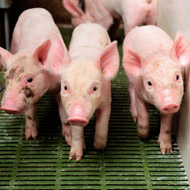New modified live vaccine for PRRS

Zoetis said the vaccine is safe to be used as the earliest protection in pigets.
A new modified live vaccine has been launched for porcine reproductive and respiratory syndrome (PRRS) virus.
Suvaxyn PRRS MLV has been launched in most EU countries. It contains a European PRRS virus strain (genotype 1) that has been grown and attenuated in a uniquely modified cell line, developed by Zoetis.
Research director Jay Calvert explained: “Suvaxyn PRRS MLV is safe based on true loss of virulence, and not based on a temporary reduction in ability to replicate in macrophage cells in the lung of the pig.”
PRRS causes reproductive losses, lowered birth rates, abortions, stillbirths, mummified foetal pigs, weak live-born piglets and deaths. It also causes respiratory disease in pigs, which impacts growth performance and is often complicated with other bacterial and viral co-infections.
Zoetis said it offers whole herd protection against PRRS and is safe to be used as the earliest protection in piglets. Immunity can therefore be achieved before the risk period, which lasts until the end of fattening. Pig protection is established 28 days after vaccination and lasts for 26 weeks in fattening piglets, or 16 weeks in gilts and sows.
Alvaro Aldaz, director of commercial development and innovation, swine, at Zoetis, said the vaccine has been shown to reduce viremia, nasal shedding and lung lesions in fattening pigs, as well as overcoming maternal immunity, which increases the efficacy of the vaccine when given to piglets during the first days of life.
Monica Balasch, associate director of global biologicals development for Zoetis, added: “In clinical studies conducted with Suvaxyn PRRS MLV, we found excellent results vaccinating pigs from the first day of age. It is safe to be used as the earliest protection in piglets, and to protect the whole herd against PRRS, as it is also safe for use in gilts and sows. The new vaccine represents a flexible alternative to allow for new customised PRRS control programs developed by veterinarians for producers.”
The most common side effects (which may affect more than one in 10 pigs) are: short-lived body temperature increase (0.5°C on average, up to 1.4°C) within four days of vaccination; and local reactions in sows (in the form of swellings which resolve without treatment in five to 32 days).



 The Federation of Independent Veterinary Practices (FIVP) has announced a third season of its podcast, Practice Matters.
The Federation of Independent Veterinary Practices (FIVP) has announced a third season of its podcast, Practice Matters.